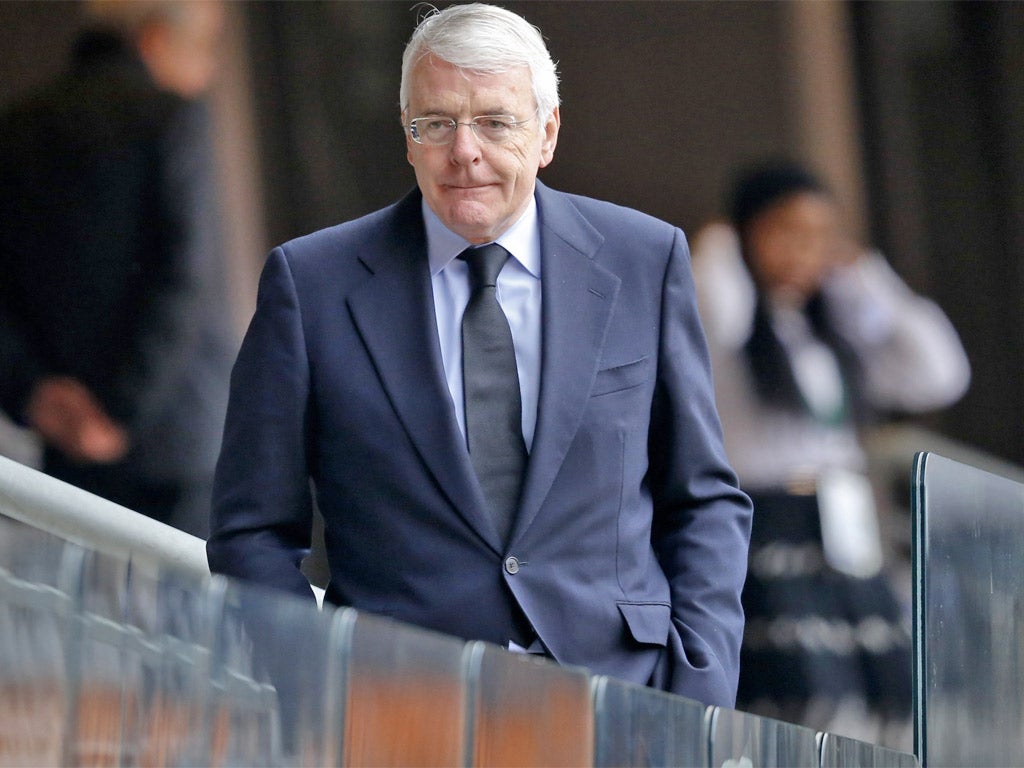Sir John Major: Margaret Thatcher's government was wrong to oppose South Africa sanctions
Former prime minister spoke out as he attended the memorial service for Nelson Mandela

Sir John Major has admitted that the Conservative Government led by Margaret Thatcher was wrong to oppose tougher sanctions against South Africa during the apartheid era.
Asked if Britain was on the wrong side of history, the former Tory Prime Minister replied: “Absolutely she was. We should have realised what was happening earlier.”
Sir John was speaking when he attended Tuesday’s memorial service for Nelson Mandela. His candour will be welcomed by the Labour politicians who have accused some Tories of “rewriting history” since Mr Mandela’s death. Although Baroness Thatcher pressed the South African Government for Mr Mandela’s release from prison, she opposed harsher economic sanctions on the grounds that they would harm the majority black population. But her stance angered the African National Congress, which she once dubbed “a typical terrorist organisation.”
David Cameron has not spoken about the Conservatives’ record on South Africa in recent days. But after becoming Tory leader, he visited the country in 2006 to meet Mr Mandela and admitted: “The mistakes my party made in the past with respect to relations with the ANC and sanctions on South Africa make it all the more important to listen now.”
Sir John attended Tuesday’s service with the other two surviving former prime ministers, Tony Blair and Gordon Brown; Mr Cameron; Nick Clegg, the Deputy Prime Minister and Ed Miliband, the Leader of the Opposition.
Mr Cameron said it was “an inspiring day, one that challenges all leaders to live up to the spirit of Nelson Mandela”, adding: “What matters now is that Mandela’s legacy for the future is secured.”
Asked what Mandela’s enduring legacy would be, Mr Blair replied: “To put out prejudice of whatever sort, whether it is race or nation or background or gender or sexuality – whatever it is, put aside prejudice. That’s what he stood for, in the end, a triumph of reason over prejudice.”
Mr Brown said of Mr Mandela: “He had a great sense of humour. In fact, he tried to persuade the Queen that an African rain princess should be presented at Buckingham Palace and the conversation went – and only he could have used these words: ‘Hello Elizabeth and how’s the Duke?' .”
Mr Miliband said President Mandela “was an incredible leader, but he was the leader of a movement and it was the movement and him that made change possible. So I think it should give one great optimism about many of the other world problems that seem insoluble, intractable.”
Mr Cameron held brief informal conversations with several world leaders and elder statesmen including Barack Obama and his predecessors George W Bush, Bill Clinton and Jimmy Carter; Francois Hollande, the French President and his predecessor Nicolas Sarkozy; Thabo Mbeki, Mr Mandela’s successor as South African President; FW de Klerk, the last President of the apartheid era and Desmond Tutu, the former Archbishop of Cape Town and prominent anti-apartheid campaigner. Mr Cameron had a brief meeting with Mr Blair but not with Mr Brown.
Subscribe to Independent Premium to bookmark this article
Want to bookmark your favourite articles and stories to read or reference later? Start your Independent Premium subscription today.

Join our commenting forum
Join thought-provoking conversations, follow other Independent readers and see their replies